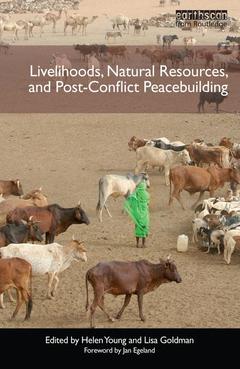Livelihoods, Natural Resources, and Post-Conflict Peacebuilding Post-Conflict Peacebuilding and Natural Resource Management Series
Coordonnateurs : Young Helen, Goldman Lisa

Sustaining and strengthening local livelihoods is one of the most fundamental challenges faced by post-conflict countries. By degrading the natural resources that are essential to livelihoods and by significantly hindering access to those resources, conflict can wreak havoc on the ability of war-torn populations to survive and recover. This book explores how natural resource management initiatives in more than twenty countries and territories have supported livelihoods and facilitated post-conflict peacebuilding.
Case studies and analyses identify lessons and opportunities for the more effective design of interventions to support the livelihoods that depend on natural resources ? from land to agriculture, forestry, fisheries, and protected areas. The book also explores larger questions about how to structure livelihoods assistance as part of a coherent, integrated approach to post-conflict redevelopment.
Livelihoods and Natural Resources in Post-Conflict Peacebuilding is part of a global initiative to identify and analyze lessons in post-conflict peacebuilding and natural resource management. The project has generated six books of case studies and analyses, with contributions from practitioners, policy makers, and researchers. Other books in this series address high value resources, land, water, assessing and restoring natural resources, and governance.
Foreword Introduction: Helping Post-conflict Communities Survive and Thrive Part 1: Natural Resource Conflicts, Livelihoods, and Peacebuilding Approaches Introduction 1. Social Identity, Natural Resources, and Peacebuilding 2. Swords into Ploughshares? Access to Natural Resources and Securing Agricultural Livelihoods in Rural Afghanistan 3.Forest Resources in Cambodia’s Transition to Peace: Lessons for Peacebuilding 4. Post-tsunami Aceh: Successful Peacemaking, Uncertain Peacebuilding 5. Manufacturing Peace in "No Man’s Land": Livestock and Access to Resources in the Karimojong Cluster of Kenya and Uganda 6. Resolving Natural Resource Conflicts to Help Prevent War: A Case from Afghanistan Part 2: Innovative Livelihoods Approaches in Post-conflict Settings Introduction 7. The Opportunities and Challenges of Protected Areas for Post-conflict Peacebuilding 8. A Peace Park in the Balkans:Cross-border Cooperation and Livelihood Creation through Coordinated Environmental Conservation 9. Mountain Gorilla Ecotourism: Supporting Macroeconomic Growth and Providing Local Livelihoods 10. The Interface between Natural Resources and Disarmament, Demobilization, and Reintegration: Enhancing Human Security in Post-conflict Settings 11. Demobilized Combatants as Park Rangers: Post-conflict Natural Resource Management in Gorongosa National Park 12. Utilizing Alternative Livelihood Schemes to Solve Conflict Problems in Sierra Leone’s Artisanal Diamond Mining Industry 13. Linking to Peace: Using BioTrade for Biodiversity Conservation and Peacebuilding in Colombia Part 3: The Institutional and Policy Context Introduction 14. Fisheries Policies and the Problem of Instituting Sustainable Management: The Case of Occupied Japan 15. Developing Capacity for Natural Resource Management in Afghanistan: Process, Challenges and Lessons Learned by UNEP16. Building Resilience in Rural Livelihood Systems as an Investment in Conflict Prevention17. Improving Natural Resource Governance and Building Peace and Stability in Mindanao, Philippines 18. Commerce in the Chaos: Charcoal, Bananas, Fisheries, and Conflict in Somalia Part 4: Lessons Learned 19. Managing Natural Resources for Livelihoods in Post-conflict Societies: Lessons Learned
Helen Young is a professor at the Friedman School of Nutrition Science and Policy at Tufts University and a research director at the school’s Feinstein International Center.
Lisa Goldman is a senior attorney at the Environmental Law Institute.
Date de parution : 11-2015
15.2x22.9 cm
Disponible chez l'éditeur (délai d'approvisionnement : 14 jours).
Prix indicatif 209,69 €
Ajouter au panierDate de parution : 03-2015
Ouvrage de 304 p.
15.2x22.9 cm
Disponible chez l'éditeur (délai d'approvisionnement : 15 jours).
Prix indicatif 96,92 €
Ajouter au panierThèmes de Livelihoods, Natural Resources, and Post-Conflict... :
Mots-clés :
management; gorongosa; national; park; parks; karimojong; cluster; alden; wily; international; Young Men; Diamond Area Community Development Fund; Mountain Gorilla; MNLF; Waterton Glacier International Peace Park; DDR Process; UNEP 2009b; NAM; DDR Program; Karimojong Cluster; Alden Wily; Peace Park; Mountain Gorilla Population; Haber Gedir; BioTrade Initiative; Charcoal Trade; Coastal Resource Management; Charcoal Production; Somali Shilling; UNSC 2003b; Post-Conflict Natural Resource Management; Natural Resource Governance; Natural Resource Management; Somali Waters; Forest Sector Reform



